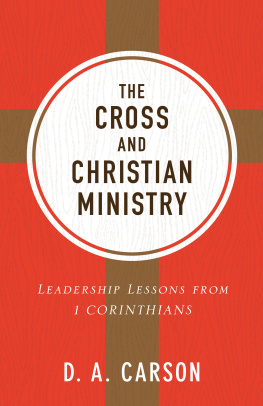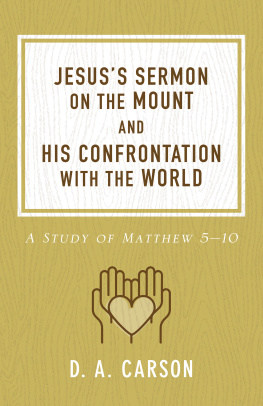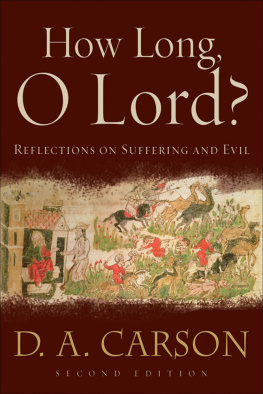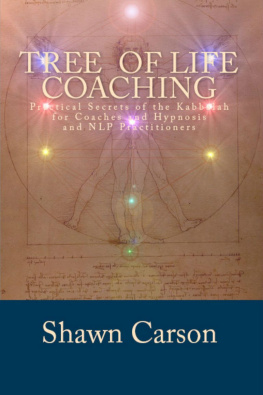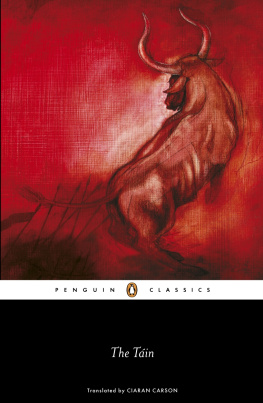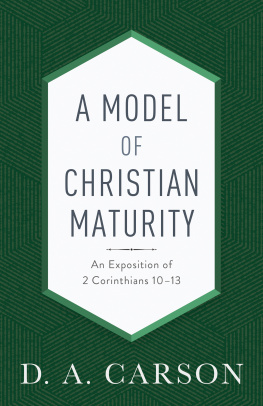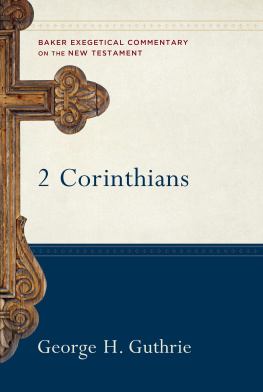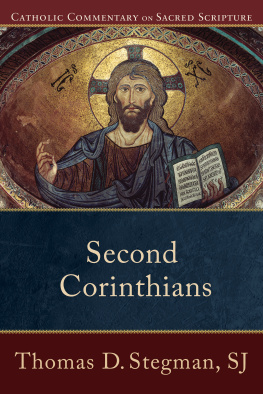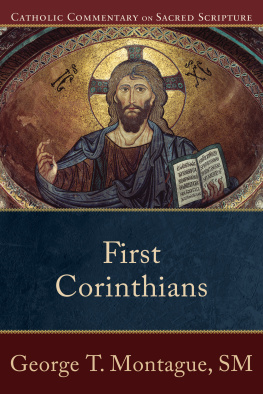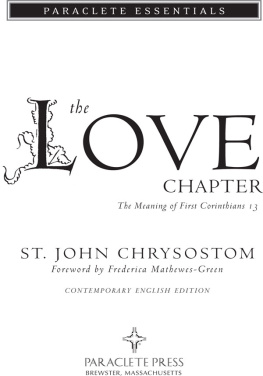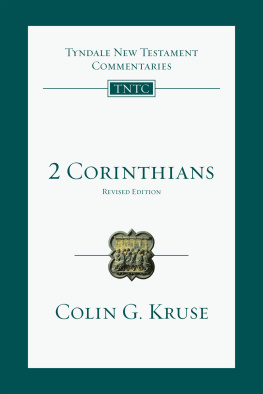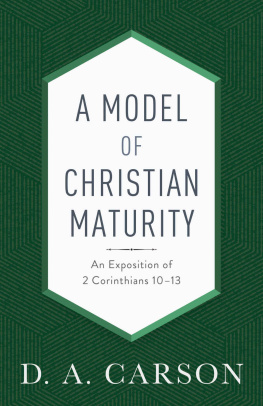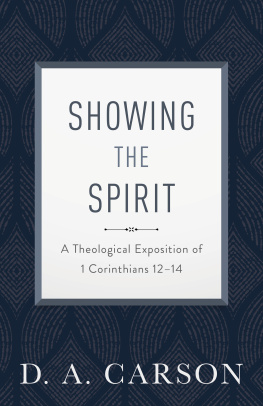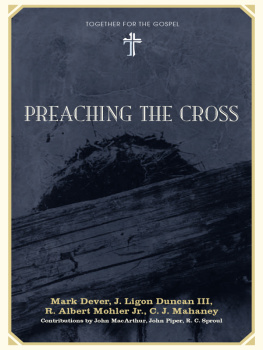1. The Cross and Preaching
2. The Cross and the Holy Spirit
3. The Cross and Factionalism
4. The Cross and Christian Leadership
5. The Cross and the World Christian
Preface
F OR TOO LONG , many evangelicals have viewed the cross exclusively as the means by which God in Christ Jesus achieved our redemption. Of course, no Christian would want to minimize the centrality of the cross in Gods redemptive purposes. But if we view it as the means of our salvation and nothing more, we shall overlook many of its functions in the New Testament. In particular, so far as this study is concerned, we shall fail to see how the cross stands as the test and the standard of all vital Christian ministry. The cross not only establishes what we are to preach, but how we are to preach. It prescribes what Christian leaders must be and how Christians must view Christian leaders. It tells us how to serve and draws us onward in discipleship until we understand what it means to be world Christians.
The content of the five chapters of this book was first prepared as a series of four talks (chaps. 3 and 4 were developed from one) for the International Council of Accrediting Agencies (ICAA), an affiliate of the World Evangelical Fellowship. The ICAA coordinates several regional accrediting agencies whose purpose is the promotion of high-quality theological education in evangelical institutions around the world.
The series of talks was then revised and presented afresh at the quadrennial world congress of the International Federation of Evangelical Students (IFES). Representatives attended from 108 or 109 countries. It was an enormous privilege to try to expound Gods Word to them. In countless private conversations, I learned a great deal from these brothers and sisters in Christ, and I am grateful to God for their steadfastness, zeal, and unassuming leadership.
What you have before you has been revised once again, this time to accommodate the printed page. Although the form of these chapters is an exposition of parts of 1 Corinthians, my concern goes far beyond antiquarian interest. The message of these sections from 1 Corinthians must be learned afresh by every generation of Christians, or the gospel will be sidelined by assorted fads.
It is now commonplace to confess that evangelicalism is fragmenting. To the extent that this is true, it is utterly imperative that we self-consciously focus on what is centralon the gospel of Jesus Christ. That means we must resolve to know nothing... except Jesus Christ and him crucified (1 Cor. 2:2), in exactly the same way that Paul made that resolution. This will shape our vision of ministry as much as it will shape our grasp of the centrality of the gospel.
I would be remiss if I did not express my gratitude to Baker Publishing Group for maintaining its interest in this series of basic biblical expositions. Is there anything more important than learning to think Gods thoughts after him?
Soli Deo gloria
1
The Cross and Preaching
1 Corinthians 1:182:5
For the message of the cross is foolishness to those who are perishing, but to us who are being saved it is the power of God. For it is written:
I will destroy the wisdom of the wise; the intelligence of the intelligent I will frustrate.
Where is the wise man? Where is the scholar? Where is the philosopher of this age? Has not God made foolish the wisdom of the world? For since in the wisdom of God the world through its wisdom did not know him, God was pleased through the foolishness of what was preached to save those who believe. Jews demand miraculous signs and Greeks look for wisdom, but we preach Christ crucified: a stumbling block to Jews and foolishness to Gentiles, but to those whom God has called, both Jews and Greeks, Christ the power of God and the wisdom of God. For the foolishness of God is wiser than mans wisdom, and the weakness of God is stronger than mans strength.
Brothers, think of what you were when you were called. Not many of you were wise by human standards; not many were influential; not many were of noble birth. But God chose the foolish things of the world to shame the wise; God chose the weak things of the world to shame the strong. He chose the lowly things of this world and the despised thingsand the things that are notto nullify the things that are, so that no one may boast before him. It is because of him that you are in Christ Jesus, who has become for us wisdom from Godthat is, our righteousness, holiness and redemption. Therefore, as it is written: Let him who boasts boast in the Lord.
When I came to you, brothers, I did not come with eloquence or superior wisdom as I proclaimed to you the testimony about God. For I resolved to know nothing while I was with you except Jesus Christ and him crucified. I came to you in weakness and fear, and with much trembling. My message and my preaching were not with wise and persuasive words, but with a demonstration of the Spirits power, so that your faith might not rest on mens wisdom, but on Gods power.
W HAT WOULD YOU THINK if a woman came to work wearing earrings stamped with an image of the mushroom cloud of the atomic bomb dropped over Hiroshima?
What would you think of a church building adorned with a fresco of the massed graves at Auschwitz?
Both visions are grotesque. They are not only intrinsically abhorrent, but they are shocking because of powerful cultural associations.
The same sort of shocked horror was associated with cross and crucifixion in the first century. Apart from the emperors explicit sanction, no Roman citizen could be put to death by this means. Crucifixion was reserved for slaves, aliens, barbarians. Many thought it was not something to be talked about in polite company. Quite apart from the wretched torture inflicted on those who were executed by hanging from a cross, the cultural associations conjured up images of evil, corruption, abysmal rejection.
Yet today, crosses adorn our buildings and letterheads, grace our bishops, shine from lapels, and dangle from our earsand no one is scandalized. It is this cultural distance from the first century that makes it so hard for us to feel the compelling irony of 1 Corinthians 1:18: For the message of the cross is foolishness to those who are perishing, but to us who are being saved it is the power of God.

